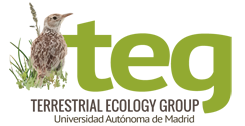REMEDINAL TE CM Ref: P2018/EMT4338
The need for science-based solutions to address environmental issues is at the core of the United Nations Sustainable Development Goals (UN SDG). However, the transference of scientific knowledge, the potential technological development based on such knowledge and the formation of partnerships created to achieve the 2030 Agenda for Sustainable Development still remain elusive tasks. Thus, it is crucial to build and consolidate knowledge networks able to offer innovative solutions and where all partners involved in the achievement of sustainability are involved.
In this context, the R&D network Remedinal (https://remedinal.wordpress.com) has become a key source of both basic and applied scientific ecological data over the past 12 years. Our program is currently a key reference in this field, not only at the national level but also worldwide. At its origin, Remedinal focused on basic questions related to ecological restoration, but, being aware of the growing need of information on Mediterranean ecosystems, the program evolved to incorporate critical aspects on global change, conservation biology and ecosystem services. The work performed in Remedinal has resulted in outstanding scientific achievements, most of them published in toptier journals, including Science and Nature. The program has also fostered the development of European level research grants and has contributed to the training and education of a very high number of young researchers through the official Masters degrees linked to Remedinal. This basic knowledge generated by the participant research groups can contribute to find solutions for the difficult challenges presented in SD goals 2, 11, 13, 14 and 15, among others. Moved by the necessity to transfer this scientific knowledge to society, the members of Remedinal are actively involved in projects of direct impact, as well as the development of documents and legislative frameworks to deal with the challenges that we face as a society. A case in point is the leadership and edition of the Estrategia Estatal de Infraestructura Verde Conectividad y Restauración Ecológicas, the participation on the decrees to create a Habitat Bank or the development of the basic guidelines of restoration measurements in the context of adaptation to global warming. In this context, our goal is to go one step further. Our aim is to actively participate in the development of the rising Translational Ecology, an emergent discipline where ecologists and all other agents involve in decision making (including politicians) work together to develop a new research framework where the ecological, societal and political dimensions are explicitly considered in each environmental problem. Specifically, our goal is to incorporate our work in an integrative framework in order to achieve the Sustainable Development goals by 2030, being aware that our scientific knowledge is key for this goal. It has come the time to abandon our ivory tower to ensure the effective transference of such knowledge to decision making.

